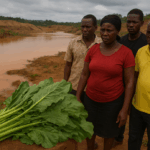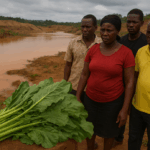
Recent studies and media reports have drawn attention to the growing threat of heavy metal contamination in Ghana’s food system, particularly in fruits and vegetables grown near illegal mining sites. Alarming levels of mercury, lead and arsenic were found in food samples and fish across mining-affected regions. These metals, released through galamsey activities, damage soil fertility, pollute rivers, and endanger public health. While we know that eating more fruits and vegetables is critical for good health, galamsey threatens to undermine this very foundation of nutrition.
How Galamsey Affects Food Security
Illegal mining is not just about pits and rivers turned brown. It directly disrupts food security in several ways. It destroys arable land and contaminates rivers and streams with mercury, lead, and other pollutants, leaving less fertile soil and unsafe water for farming. As a result, food production declines, and many farming families are displaced from their lands. The lure of quick income from mining also draws young people away from agriculture, further reducing the labour force needed for food production. These disruptions lead to higher food prices and limited access to safe, diverse produce, forcing many households to depend on cheaper, ultra-processed foods that compromise nutrition and health.
The Hidden Dangers of Heavy Metals
Heavy metals like mercury, lead, cadmium, and arsenic are toxic even in small amounts. They enter our bodies through contaminated water, food, and air. Once inside, they can:
- Damage tissues by creating harmful molecules (reactive oxygyen species).
- Interfere with vital enzymes and proteins.
- Damage DNA, raising cancer risks.
The health consequences are severe: neurological damage, reduced IQ in children, kidney disease, bone weakness, high blood pressure, reproductive problems, and increased risk of cancers among other negative health effects. The danger lies in the chronic exposure with small amounts accumulating in the body over time.
So, Should We Stop Eating Fruits and Vegetables?
Fruits and vegetables remain essential for health and must be eaten. The first and perhaps most critical step toward restoring confidence in our food system is for government to act urgently to protect the nation’s food supply from the growing threat of galamsey. Stronger regulation and enforcement are needed now to stop illegal mining and safeguard agricultural lands and water bodies from further destruction. Regular monitoring of food and water safety, backed by transparent public reporting, should become a national priority.
What Steps Individuals and Households Can Take to Stay Safe
- Source fruits and vegetables from safer areas – Buy produce from markets or farms located far from mining zones can reduce risk of exposure.
- Wash produce thoroughly under running water – Washing fruits and vegetables under clean running water removes much of the soil and surface residues that may contain contaminants. Though washing may not eliminate contaminants already absorbed by the plant, it remains one of the most effective household measures for reducing risk.
- Peel skins of fruits and vegetables where possible – Peeling helps remove surface contaminants that washing might miss and can significantly reduce heavy metal intake, especially for produce like yams, cassava, cucumbers, and mangoes.
- Boil vegetables and discard the cooking water – Research shows that boiling leafy vegetables such as kontomire, lettuce, and spring onions, then discarding the cooking water, can greatly lower contaminant levels. Although some heat-sensitive nutrients may be lost, this remains one of the most practical methods for families living in or near mining areas to reduce exposure.
- Grow backyard gardens using safe soil and water sources – Household gardens offer a way to control how food is grown and to ensure cleaner produce. However, they are only as safe as the soil and water used.
In Summary
Protecting our food system from the galamsey menace begins with collective responsibility – individuals and households making informed choices and taking precautions, and government enforcing strict environmental and food safety regulations. When consumers remain vigilant and policymakers act decisively, Ghana can take a vital step toward ensuring that every citizen can eat fruits and vegetables without fear.
Click here to join Full Proof Nutrition WhatsApp channel to receive more educative content. Send us a mail on [email protected]
Written by Dr. Laurene Boateng (PhD, RD)
Dr. Laurene Boateng is a Registered Dietitian and Senior Lecturer in the Department of Dietetics, University of Ghana. She is the founder and editor-in-chief of Full Proof Nutrition, a Nutrition Consultancy committed to providing reliable, evidence-based, and practical healthy eating advice through its website www.fullproofnutrition.com. Click here to join Full Proof Nutrition WhatsApp channel to receive more educative content. Send us a mail on [email protected]
References
- Atitsogbey, P., Kyereh, E., Ofori, H., Johnson, P.-N. T., & Steiner-Asiedu, M. (2023). Heavy metal, microbial and pesticides residue contaminations are limiting the potential consumption of green leafy vegetables in Ghana: An overview. PMC / NCBI.
- Adoma, P. O., et al. (2024). Health Risk Assessment of Heavy Metals in Lettuce and Spring Onion in Ghana. PMC / NCBI.
- Adjei-Mensah, R., et al. (2021). Effect of home processing methods on the levels of heavy metals in vegetables grown near mining areas. ScienceDirect.
- President Commissions 36.5 Million Dollars Hospital In The Tain District
- You Will Not Go Free For Killing An Hard Working MP – Akufo-Addo To MP’s Killer
- I Will Lead You To Victory – Ato Forson Assures NDC Supporters
Visit Our Social Media for More




